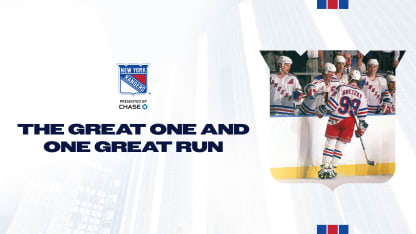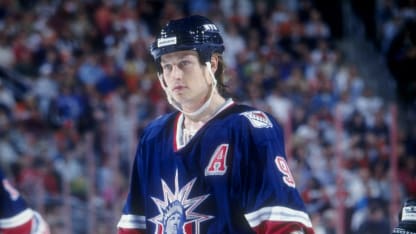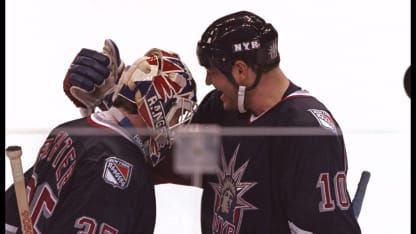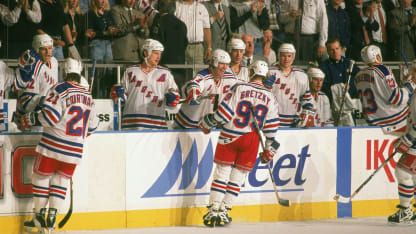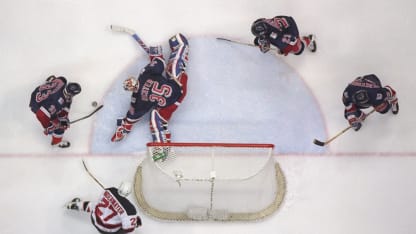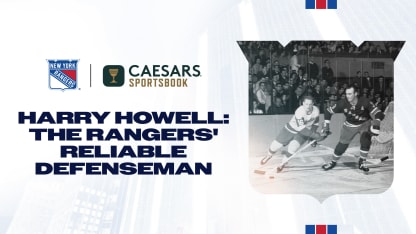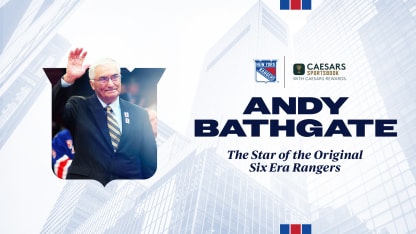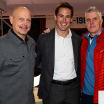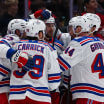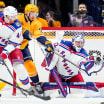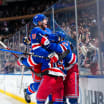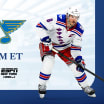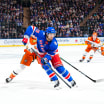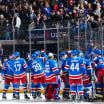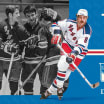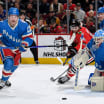The Rangers’ opponent in the Eastern Conference Final was the Philadelphia Flyers, a team that finished one point behind New Jersey in the regular season, had one of the game’s superstars in Eric Lindros, and one of the league’s most feared lines at the time, the “Legion of Doom” trio that featured Lindros, John LeClair, and Mikael Renberg.
Although the Rangers had won eight of 10 games through the first two rounds of the playoffs, there was an undercurrent that was starting to affect the team – injuries. The Blueshirts already entered the playoffs without Kovalev, who suffered a torn ACL in January that sidelined him for the remainder of the season. Bill Berg, a key member of the Rangers’ checking line, suffered a fractured leg in Game 3 of the series against Florida that sidelined him for the rest of the playoffs. Niklas Sundstrom, one of the Rangers’ talented, young forwards who had 24 goals and 52 points in the regular season, sustained a broken arm on a check from the Devils’ John MacLean in Game 4 of the series against New Jersey that ended his season prematurely.
As the Eastern Conference Final got underway, this theme would unfortunately continue for the Rangers. Just like the first two rounds, the Rangers lost Game 1, as the Flyers began the series with a 3-1 win in Philadelphia. And, as was the case in the first two series, the Rangers responded with a road win in Game 2.
With injuries to the Rangers’ forwards mounting, and the team unable to get the last change on the road, Head Coach Colin Campbell decided to use Messier and Gretzky on the same line, along with Tikkanen, while Graves, who usually played on Messier’s left wing, would center a checking line. The line shuffling worked in Game 2, as Gretzky scored a hat trick, Messier added three points, including the game-winning goal, and the Rangers escaped Philadelphia with a 5-4 win.
What they couldn’t escape from, however, was an injury to one of their most important players. With just over six minutes remaining in the third period, Leetch was hit into the boards behind the Rangers’ net by Philadelphia’s Trent Klatt, and his right wrist took the brunt of the impact.
Always a warrior and never one to make excuses, Leetch returned to the game and stayed in the lineup for the remainder of the series, but it was noticeable that he was playing through an injury.
In addition to Leetch, the Rangers’ injury list only grew prior to, and during, Game 3. Patrick Flatley, who, like Berg, was invaluable on the Rangers’ checking line, suffered a rib injury in Game 1 that kept him out for the rest of the series. Ken Gernander, who had been recalled from the Rangers’ AHL affiliate in Binghamton following injuries to several of the team’s forwards, suffered a concussion and separated shoulder after taking a hit from Klatt (his brother-in-law) in the opening minutes of Game 3.
And, besides the injuries that were adding up, Karpovtsev returned to Russia on the morning of Game 3 after learning that his mother passed away, and he ultimately missed Game 3 and Game 4 of the series.
Although the odds appeared to be stacked against them, the Rangers fought valiantly. They rallied twice in the third period of Game 3 to tie the game, but the Flyers scored three unanswered goals late in the third period to win the contest, 6-3. By the start of Game 4, the Rangers only had six forwards in the lineup who had started the season with the team – Messier, Gretzky, Graves, Robitaille, Shane Churla, and Darren Langdon. Dallas Eakins, who was a defenseman in the Rangers organization, had been moved up to forward to fill in on the team’s checking line.
Once again, the Rangers continued to battle in Game 4. Trailing 1-0 early in the third period, Tikkanen scored a shorthanded goal to tie the contest. The Flyers regained the lead by scoring a shorthanded goal of their own with less than four minutes remaining in regulation, but the Rangers tied the game again just over a minute later, when Leetch took a centering pass from Gretzky behind the net and scored on a one-time shot from right in front of the net.
The Flyers, however, got a power play opportunity late in regulation, and with 6.8 seconds left on the clock, Lindros beat Richter with a backhand shot to put Philadelphia ahead for good.
Two days later, the Rangers lost Game 5, 4-2, in Philadelphia, and their season came to an end. While the ending wasn’t what the team had envisioned, the heart the team showed and moments they created throughout the course of the season made them one of the most memorable teams in franchise history.
“I really loved that team,” Richter said. “It was a great group of guys and had a great run until we were banged up and injured towards the end."
“I shake my head about that season sometimes,” Messier wrote in his autobiography No One Wins Alone. “We made it to the conference finals on half a roster running on fumes, and lost to a Philly team running on all cylinders. Maybe if we’d been healthy, we still wouldn’t have won, but that doesn’t diminish the fact that everybody gave their hearts. What we were able to accomplish that year can’t be looked on as a failure. If you do, you overlook the integrity of what was done. If underachieving is among the worst things in sports, then pushing beyond what you’re capable of is a badge of honor.”
Looking back, Gretzky – who is quick to acknowledge how well he was treated by the fans in not only 1996-97 but also throughout his three-year tenure with the team and subsequent years – said that one of the rewarding parts of that year was learning about the people of New York and why it’s special to be a Ranger. And it’s something that resonates as much today as it did over a quarter of a century ago.
“The thing I found most interesting in New York is that the people are really hard-working, and they just want to see an honest effort,” Gretzky said. “If you give an honest effort, play to the best of your ability, and play as hard as you can each and every night, the people will back you. That is what I found out about New York."

